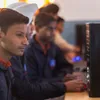Here's how talent evaluation company Aspiring Minds quantifies employability to bridge skill gaps
Started in Gurugram in 2008, Aspiring Minds has released a range of skill tests which job seekers can take to get connected with potential employers.
To address unemployment among Indian youth, Government initiatives such as Skill India and National Skill Development Mission under the Ministry of Skill Development and Entrepreneurship (MSDE) have been working to empower them with skill sets to make them more employable.
But how does one define employability?
At a macro level, it is largely an abstract concept. Employers may all have different opinions of what they consider an employable person for a particular line of work.
This was a question Gurugram-based entrepreneurs Himanshu Aggarwal and Varun Aggarwal were grappling with in 2007.
From an early stage, they believed that the term 'employability' was used in a loose manner and divorced from its quantitative value. According to them, recruiters were more focussed on educational background and the institution that candidates came from. However, education was only one of the parameters of employability.
One day, they chanced upon a report on unemployability, and saw that institutions in India were attempting to fix unemployment through education and training programmes.
They felt that there was a need to scientifically define employability before attempting to fix it. The brothers also believed that this definition needed to account for the specific parameters and assessments that measured a person's suitability for a job role.
And nobody else was really trying to quantify employability in this manner.
An idea is born
Varun Aggarwal tells SMBStory:
"The job industry mostly looks for four kinds of skills: Language, cognitive skills (aptitude/problem solving), functional skills (core skills) and soft skills.
The big skill gap between potential employee and employers ignited the spark for the brothers to start Aspiring Minds, an AI-powered talent evaluation company that aimed to assess and quantify employability of jobseekers.
The brothers were convinced that structured scientific assessments could get them very close to objectively evaluating employability.

Aspiring Minds co-founders Himanshu Aggarwal (left) and Varun Aggarwal (right)
The idea was that employability could be assessed using automated assessments, which would be available to all students in the country. Aspiring Minds would charge jobseekers a nominal fee for taking these assessments.
Then, corporate employers or small businesses would sign up with Aspiring Minds to access its database of students who were assessed and certified in a particular field.
This would not only become a fair and scalable mechanism for the corporates to access talent, but also provide detailed employability feedback to the young, prospective workforce, according to the founders.
Thus, students and employers would constitute Aspiring Minds' two streams of revenue.
With this business model in mind, Aspiring Minds started off with as a for-profit and private bootstrapped company in 2008.
During these initial stages, Varun met Professor Tarun Khanna from Harvard Business School, who mentored the brothers on the nuances of running a startup.
The brothers raised their Angel round of funding in late 2008, followed by a Series A funding from Omidyar Networks, a global philanthropic investment firm founded by Pierre Omidyar, in 2011.
The brothers then began releasing a range of products which help quantify employability and improve assessment not only for engineers but also for other professionals.
"The [unemployability] situation is not very different for other professionals. 50 percent students lose out because of lack of English language skills, while only 15 to 20 percent have the functional skills the companies are looking for," Varun says.
"Functional skills are very much part of the college curriculum, but college teaching is mostly based on rote learning. This implies that students do not understand concepts and fail to apply them," he adds.
To target a range of professionals in different sectors, Aspiring Minds released its adaptive test AMCAT, language test SVAR, AI-powered automated programming test AUTOMATA, motor skills test TESLA, and more.
Scaling up and its challenges
Aspiring Minds has been selling these tests to jobseekers, and consequently, the jobseeker database to employers, for 12 years now.
Its successful model has taken its operations to the US, China, India, Middle East, Philippines, and Sub-Saharan Africa.
It has also partnered with colleges and universities across the country for assessment of employability skills.
Varun says, "Efforts to impart these skills must be made early on, right from adolescence. Language skills too, can be developed during school and later. Colleges should provide programmes to improve language skills."
According to him, when the students first enter college, there should be administered tests to find the gaps in language and cognitive skills.
But for a company to deal with thousands of students, graduates, and other jobseekers, it has to put in a big effort in scaling up its existing capabilities.
However, it is difficult to scale up any social entrepreneurship effort in an emerging economy without partnering with the government. And this is exactly what Aspiring Minds did.
As part of its partnership with National Skill Development Corporation (NSDC), Aspiring Minds is involved in assessment, benchmarking, and certification of candidates enrolled under various NSDC training programmes. It is also developing a national skill pool for all NSDC partners/potential employers.
NSDC also noted in its partnership that the AMCAT has become India’s largest employability test.
Besides scaling up, another roadblock for the company was gaining acceptance from stakeholders on the concept of paying for an assessment of employability, as it was not a conventional concept such as paying for training or placement.
The 2008-09 recession was also a stumbling block but the company says it took this time to focus on building better products and broadening the scope of its tests to expand into new sectors such as banking and financial services, BPO sector, retail, and more.
Another challenge comes in the form of training organisations, job portals, and placement agencies which offer a part of Aspiring Minds' value proposition. But Aspiring Minds and its founders say they will continue to innovate and stay ahead of the curve on the global map.
Aspiring Minds also wants to continue scaling up and launch new products in assessment technology. In the near future, it is also expanding to new geographies to strengthen its employment ecosystem while working towards its vision of creating a merit-driven talent ecosystem.









